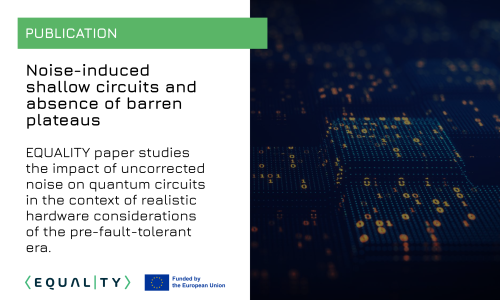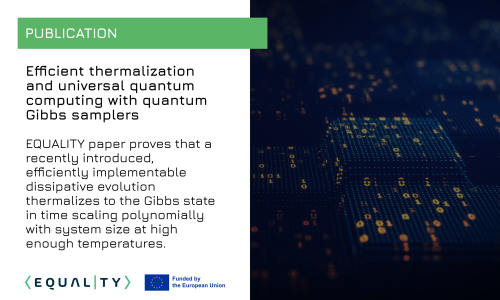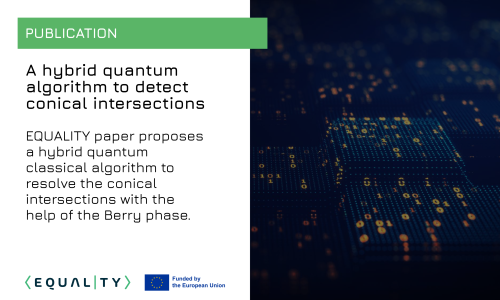This goal can only be achieved with a mission-oriented approach. We must continue exploring the most challenging scientific questions while keeping industrially-relevant problems as targets. This helps the various research directions to converge and fosters collaboration across the entire quantum computing ecosystem.
The EQUALITY project is driven by this vision. The consortium has identified a set of eight paradigmatic industrial problems where quantum capabilities could be transformational in the near future: airfoil aerodynamics, battery design, fuel cell design, battery materials design, fluid dynamics, space mission optimisation, multidisciplinary optimisation, and space data analysis.
These problems are computationally complex and are faced routinely by the industrial partners in this project. In many cases, the computational requirements needed to perform these computations are enormous. This forces engineers to use simplistic models or rely on expensive build-and-test cycles. For instance, aerodynamics simulations involve solving the notoriously difficult Navier-Stokes equations. Today, it is more feasible to test a model in a wind tunnel than to solve these equations in full generality. The situation is similarly complex for Li-ion batteries and fuel cell simulations. The ability to tackle such questions computationally would give a competitive edge to the European industry. Moreover, energy-efficient aerodynamics and more durable and affordable batteries will be critical to propelling these industries towards zero emissions.
EQUALITY brings together leading research groups, SMEs, and prominent industrial players towards the goal of developing quantum algorithms for real problems and testing them on real quantum hardware.
To this end, we will develop a set of quantum algorithm primitives with wide applicability: differential equation solvers, stochastic differential equation solvers, quantum generative models, quantum chemistry simulators, simulators for periodic materials, quantum evolution kernel methods, non-kernel quantum machine-learning techniques, and Gibbs state-based optimisation.
These core algorithms are designed mainly in a hardware-agnostic fashion. However, to advance the field towards real industrial applications, we must account for limitations and the variety of present-day and near-term quantum hardware.
Thus, a large portion of our efforts will go into developing strategies to exploit scarce and noisy quantum resources optimally. The project will develop six different optimal hardware exploitation strategies: divide-and-conquer strategies, optimal qubit routing algorithms, exploitation of analogue mode simulations, efficient trap-based noise characterisation, logic-based methods for circuit optimisation, and machine learning-based methods for circuit optimization.
The quantum routine is optimised using a different combination of such techniques depending on the type of hardware. After the initial problem definition, the algorithm is tested on an ideal emulator with 20-30 qubits capacity. If the results are promising, then the next level of complexity is to test the algorithm in a more powerful ideal emulator (Tensor Network-based, for example) with a capacity of around 100 qubits. Then, information regarding processor topology and a hardware-specific noise model are incorporated. If results continue to hold, we move to the actual hardware platform. Finally, we can increase the problem complexity and iterate. We follow this methodology to keep the number of degrees of freedom under control and identify the source of any problem or failure.
The algorithms will be tested on quantum hardware platforms like PASQAL (Rydberg atoms), AQT (trapped ions), IQM (superconducting), DLR (trapped ions), and PNCQH (hybrid), OpenSuperQ (superconducting), which are closely related (or nested within) projects from the Quantum Flagship Initiative.
EQUALITY will set the foundation for developing novel simulation and mathematical modelling tools for industrial use, running on leading European quantum hardware. The target applications have the potential to create billions of euros for end-users and technology providers over the coming decades. With EQUALITY, we aim to play a role in unlocking this value and placing Europe at the centre of this development.
Latest News

20 March 2024
Publication: Noise-induced shallow circuits and absence of barren plateaus
In this work, EQUALITY partners from Inria and collaborators, motivated by realistic hardware considerations of the pre-fault-tolerant era, study the impact of uncorrected noise on quantum circuits.
View Article
19 March 2024
Publication: Efficient thermalization and universal quantum computing with quantum Gibbs samplers
In this work, EQUALITY partners from Inria and collaborators prove that a recently introduced, efficiently implementable dissipative evolution thermalizes to the Gibbs state in time scaling polynomially with system size at high enough temperatures
View Article
20 February 2024
Publication: A hybrid quantum algorithm to detect conical intersections
In this work, EQUALITY partners from Leiden University, Pasqal, and collaborators propose a hybrid quantum classical algorithm to resolve the conical intersections with the help of the Berry phase. Due to its connection to the topology, such an algorithm is much more robust to errors and noise.
View Article